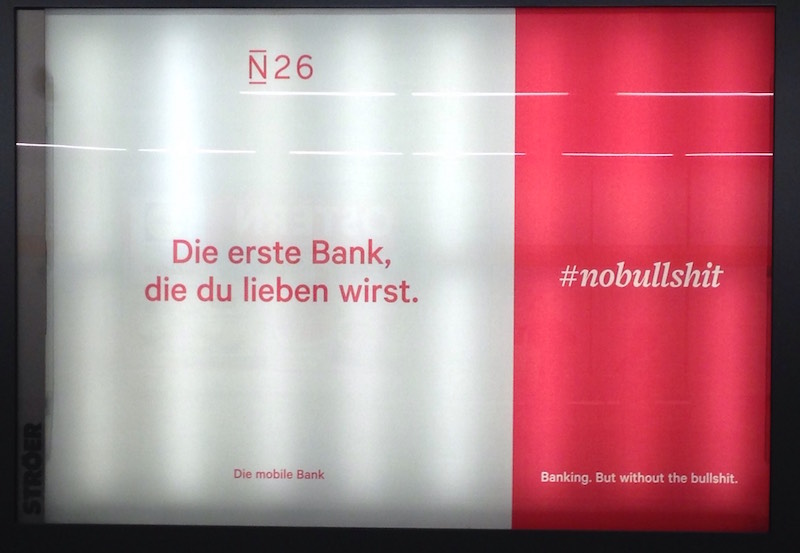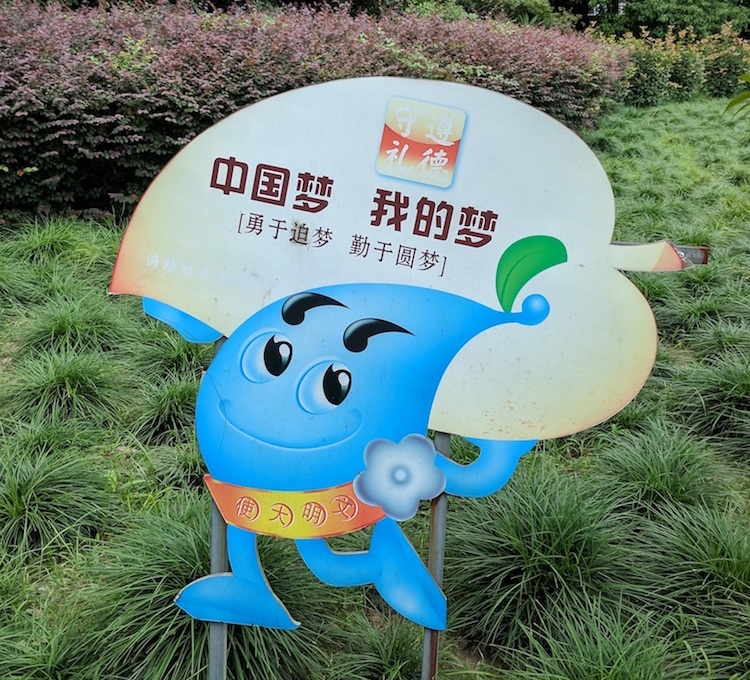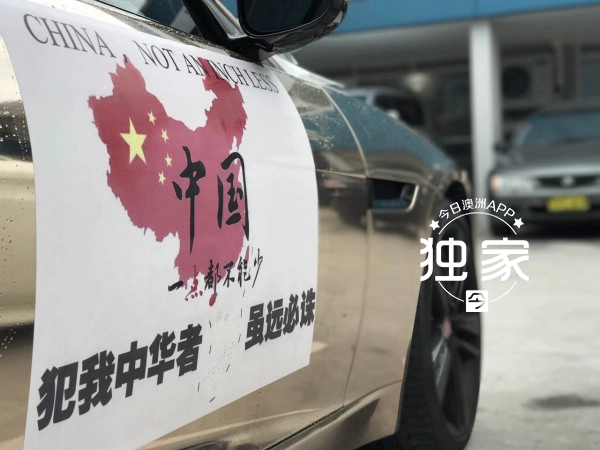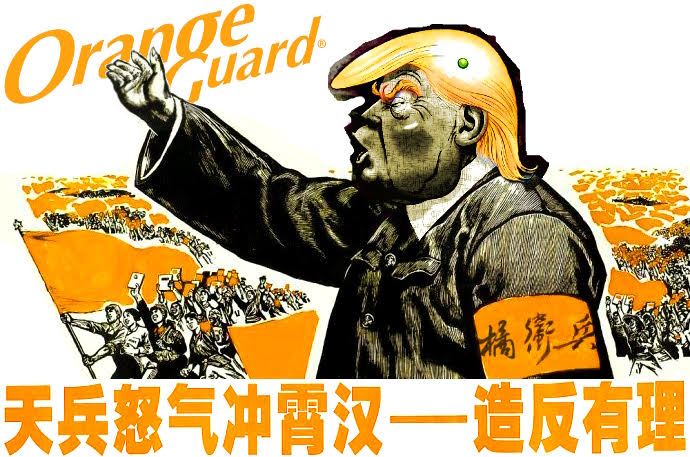Archive for Slogans
June 21, 2018 @ 6:04 pm· Filed by Victor Mair under Intonation, Language and business, Slogans
Last week there were large scale truckers strikes in many parts of China. China watchers around the world were stunned, especially since some of the strikers were shouting out what sounded like "overthrow the Communist Party!", as at 3:48 in this video.
Here's the audio portion of the leader of one of the strikes shouting what sounds like "dǎdǎo gòngchǎndǎng 打倒共产党" ("overthrow the Communist Party") into a microphone, followed by a throng of truckers responding in unison.
Audio clip: Adobe Flash Player (version 9 or above) is required to play this audio clip. Download the latest version here. You also need to have JavaScript enabled in your browser.
Read the rest of this entry »
Permalink
April 7, 2018 @ 9:30 pm· Filed by Victor Mair under Language and culture, Language and politics, Language and science, Slogans
"Growing up on wolf's milk" — when I first encountered this expression, which was applied to youth who had survived the multiple catastrophes of the first quarter-century of the PRC, I took it literally because I thought that they didn't have much of anything else to eat. Naturally, though, I did wonder how they would be able to obtain a significant amount of milk from she-wolves to make a difference.
For a moment I thought that maybe starving children were going out into the woods and scavenging for Lycogala epidendrum, commonly known as wolf's milk or groening's slime, which grows on damp, rotten logs from June through November. It wasn't long, however, before I realized that the expression "growing up on wolf's milk", as it occurred in PRC parlance from the 70s and later, was being used metaphorically to describe the hardships experienced by those who endured the privations of early communist rule in China.
Read the rest of this entry »
Permalink
April 1, 2018 @ 11:02 pm· Filed by Victor Mair under Language and advertising, Second language, Slang, Slogans, Taboo vocabulary
From Josh Penney:

Read the rest of this entry »
Permalink
December 26, 2017 @ 9:55 am· Filed by Victor Mair under Language and politics, Slogans, Words words words
A week ago, I wrote a post on "CCP approved image macros" (12/17/17). Being the authoritarian, totalitarian government that it is, the Chinese Communist Party (CCP) has the power to coin, sanction, and promote whatever forms of language use it desires. This week, at the conclusion of 2017, we have this dazzling collection of CCP-approved expressions that encapsulate US-China ties during this year:
"Yearender: 2017 in review: 8 terms that matter in China-U.S. relations" (xinhuanews [12/23/17])
By highlighting these eight terms, the Chinese government clearly wishes us to recall 2017 according to these rubrics and hopes that they will become catchwords. While I don't think that they will catch on, so to speak, and stick in popular discourse, they do help us understand the mind of the CCP.
Read the rest of this entry »
Permalink
December 17, 2017 @ 9:00 pm· Filed by Victor Mair under Language and computers, Language and culture, Language and politics, Language on the internets, Slogans
Two powerful agencies of the PRC central government, Zhōnggòng zhōngyāng jìlǜ jiǎnchá wěiyuánhuì 中共中央纪律检查委员会 ("Central Commission for Discipline Inspection") and Zhōnghuá rénmín gònghéguó jiānchá bù 中华人民共和国监察部 ("People's Republic of China Ministry of Supervision"), have issued "bā xiàng guīdìng biǎoqíng bāo 八项规定表情包" ("emoticons for the eight provisions / stipulations / rules"); see also here. The biǎoqíng bāo 表情包 (lit., "expression packages") were announced on December 4, 2017, five years to the day after the rules themselves were promulgated.
English translations of the so-called "Eight-point austerity rules" or "Eight-point regulations" may be found here and here. The rules were designed to instill greater discipline among Chinese Communist Party (CCP) members, to bring the Party "closer to the masses", and to reduce bureaucracy, extravagance, and undesirable work habits among Party members.
Read the rest of this entry »
Permalink
December 5, 2017 @ 1:27 pm· Filed by Victor Mair under Language and music, Slogans
Just heard that song on the radio. It was sung by Curtis Mayfield. I had never heard it before and was puzzled by its meaning, so I went to Wikipedia for enlightenment. Lo and behold! I found this disambiguation page:
Read the rest of this entry »
Permalink
October 31, 2017 @ 10:26 pm· Filed by Victor Mair under Borrowing, Language and politics, Multilingualism, Neologisms, Slogans
Currently circulating political poster in the PRC:

Read the rest of this entry »
Permalink
October 30, 2017 @ 1:00 pm· Filed by Victor Mair under Language and politics, Metaphors, Proverbs, Slogans
[This is a guest post by Jichang Lulu]
After coverage of dotage and DOLtage, as diagnosed by the Korean Central News Agency (KCNA), Victor Mair's latest Korean-themed post deals with a more serious condition: headlessness.
Varieties of the ailment have been reported in, e.g., chickens and compound nouns, but the latter sense would be out of place in KCNA vocabulary; (at least South) Korean linguists would talk of nouns 'lacking a nucleus' (핵어(核語) 없는 haegeo eomneun / 무핵(無核) muhaek 합성명사(合成名詞) hapseong myeongsa) rather than a 'head'. Another candidate for headlessness is the North Korean state itself, per OPLAN 5015 (작전계획(作戰計劃) 5015 jakjeon-gyehoek ogong-iro). Said PLAN involves a 'decapitation' (참수(斬首) chamsu) strike against Kim Jong-un. He's supposedly familiar with the nitty-gritty of the PLAN, reportedly obtained by hacking into South Korean military networks. The South Koreans, rumour has it, are speeding up their defence upgrade plans, so it's understandable any potential decapitees would feel uneasy.
Read the rest of this entry »
Permalink
October 24, 2017 @ 10:50 pm· Filed by Victor Mair under Errors, Slogans, Topolects, Words words words
Photograph taken by Adrian Thieret in Shanghai (Pudong) about a month ago.

Read the rest of this entry »
Permalink
August 17, 2017 @ 8:28 pm· Filed by Victor Mair under Language and politics, Slogans, Translation
Banner on the side of a fancy car in Sydney, Australia:

Read the rest of this entry »
Permalink
July 23, 2017 @ 6:24 pm· Filed by Victor Mair under Language and politics, Slogans, Translation
President Xi Jinping is fond of calling on the Chinese people to "roll up our sleeves and work hard" (lū qǐ xiùzǐ jiāyóu gàn 撸起袖子加油干 / 擼起袖子加油幹). No sooner had Xi uttered this stirring pronouncement in a nationwide address at the turn of the year (2016-17) than it became a viral meme (here and here) that has inspired countless signs, songs, and dances; enactment; and also this one, presumably in a poorly-heated environment
Read the rest of this entry »
Permalink
July 9, 2017 @ 4:25 pm· Filed by Victor Mair under Humor, Language and politics, Slogans
Created by Jonathan Smith:

Read the rest of this entry »
Permalink
April 9, 2017 @ 8:14 pm· Filed by Victor Mair under Language and politics, Puns, Slogans
The case of activist Gweon Pyeong 권평 / Pyong Kwon / Quan Ping 權平 is now going to trial in China. Gweon stands accused of wearing a t-shirt with three Xi-themed slogans printed on it:
"T-shirt slogans" (11/7/16)
In this post, I would like to explore in greater depth one of the three slogans, namely "Xí bāozi 習包子" ("steamed, stuffed / filled bun Xi").
In the earlier post, I explained how Xi Jinping acquired that curious nickname. It's really not that offensive, and it is by no means vulgar. But just what does it imply to call Xi Jinping, China's supreme leader, a "steamed, stuffed bun"?
Read the rest of this entry »
Permalink




